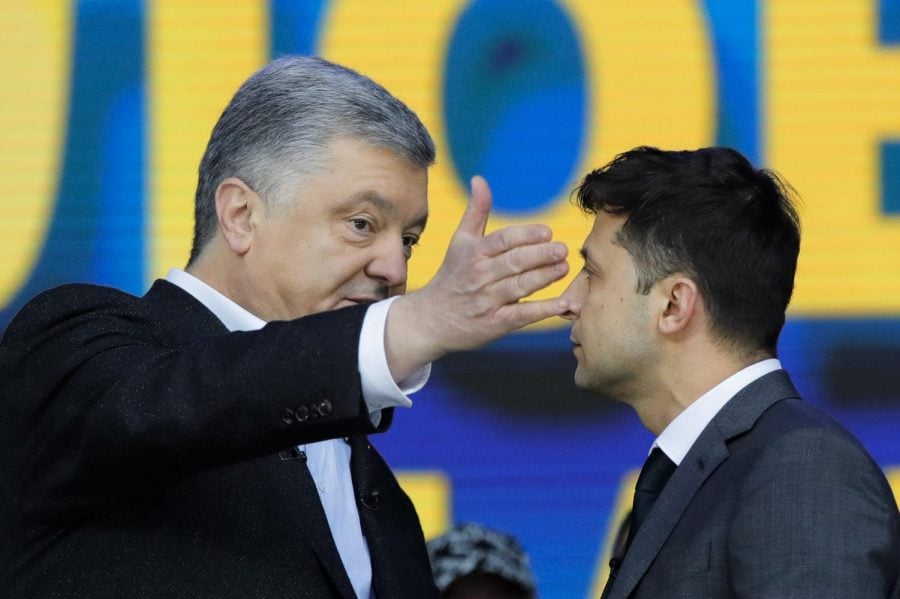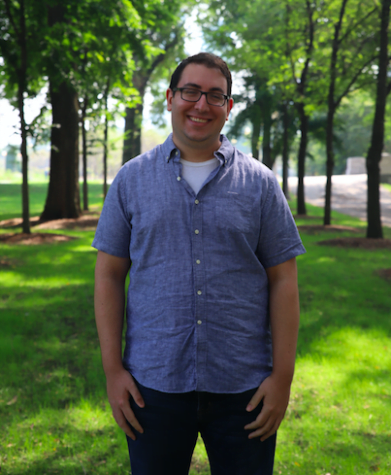Ukrainians are set to elect a new president in second-round elections Sunday, in what will be a battle between billionaire incumbent Petro Poroshenko and comedian-actor Volodymyr Zelenskiy. Zelenskiy is best known for his satirical television series “Servant of the People,” in which he plays an ordinary citizen who suddenly becomes the next president of Ukraine. Petro Poroshenko, meanwhile, has been the president of Ukraine since 2014, coming into power just after the Maidan revolution that led to the removal of predecessor Viktor Yanukovych.
While critics have questioned Zelenskiy’s lack of political experience, he garnered twice as many votes as Poroshenko in the first round of elections in late March and is widely seen as the favorite to win on Sunday; an April 18 poll from research group Reiting showed voters favoring him by 36.2 percentage points over Poroshenko.
Still, his critics say a Zelenskiy presidency may leave Ukrainians unsatisfied.
“An ‘attractive’ form of Zelenskiy as a young and new politician ‘servant of the people’ and the lack of content is the strength of the candidate Zelenskiy, but this is the weakness of [a potential] president Zelenskiy,” said Oleksii Polegkyl, a Bayduza postdoctoral Fellow at the Canadian Institute of Ukrainian Studies and a member of the Political Communication Research Unit at the University of Antwerp. Polegkyl warned that Ukrainian voters may be placing too many expectations on Zelenskiy that he won’t be able to live up to.
“If Zelensky wins the election — they will be very quickly disappointed, [and] that will lead to enormous dissatisfaction,” he said.
Some critics also question Zelenskiy’s connection to Ihor Kolomoiskiy, the Ukrainian oligarch who used to own Privat Bank before Poroshenko nationalized it. Kolomoiskiy is a part owner of 1+1 Media Group, which airs Zelenskiy’s TV show.
Despite these concerns, Zelenskiy has garnered support from an electorate eager for change, and the international community has begun to take notice: Zelenskiy and Poroshenko met separately with French prime president Emmanuel Macron about three weeks after the first-round elections, and Zelenskiy’s chief of staff, Ivan Bakanov, visited Washington a week later. Russia appears to be interested in making inroads with the likely winner of Sunday’s elections as well: in a Reuters story published April 18, Kiev-based Putin ally Viktor Medvedchuk said that Moscow is planning a wait-and-see approach, with the hopes that a peace deal could be brokered between the countries to end a long-running conflict over Russian separatist-controlled regions in eastern Ukraine.
“A Zelenskiy presidency could make a difference IF AND ONLY IF [sic] it seizes the opportunity see the issues and the effort to respond to it with complexity and sophistication,” said DePaul political science professor Richard Farkas, who specializes in post-Communist and post-conflict countries, via email. “The general public in these systems does not appreciate the complexities of the job of effective political management … There are long-term solutions that will require patience among the public — a condition not at all common among the general public.”
Observers have pointed to Zelenskiy’s easygoing style in contrast with Poroshenko’s tedious demeanor. But Poroshenko has more experience in politics, touting his role in granting autonomy to the Orthodox Church of Ukraine — separate from the Moscow Patriarchate under whose umbrella it was administered for 330 years — visa-free for travel for Ukrainians staying in the EU and a fiercely anti-Russia stance as a few of his selling points.
“Poroshenko didn’t do anything that he promised to achieve when he was a president, and now he hopes to prolong his presidency?” said Andrey Burtnyak, a Ukrainian citizen. “His net worth grew since he became a president, taking money from people only to fulfill his needs. It doesn’t look like he is interested in bringing stability and improvements to the country.”
In 2018, the president of Ukraine declared an income of roughly $50 billion, according to Russia’s state-owned TASS news agency. His main business is the Roshen chocolate company, leading him to receive the nickname “The Chocolate King.” The BBC reported his estimated net worth at more than $1 billion.
On Sunday, Ukrainians will make their final choice between this king of confections and his untested rival.



